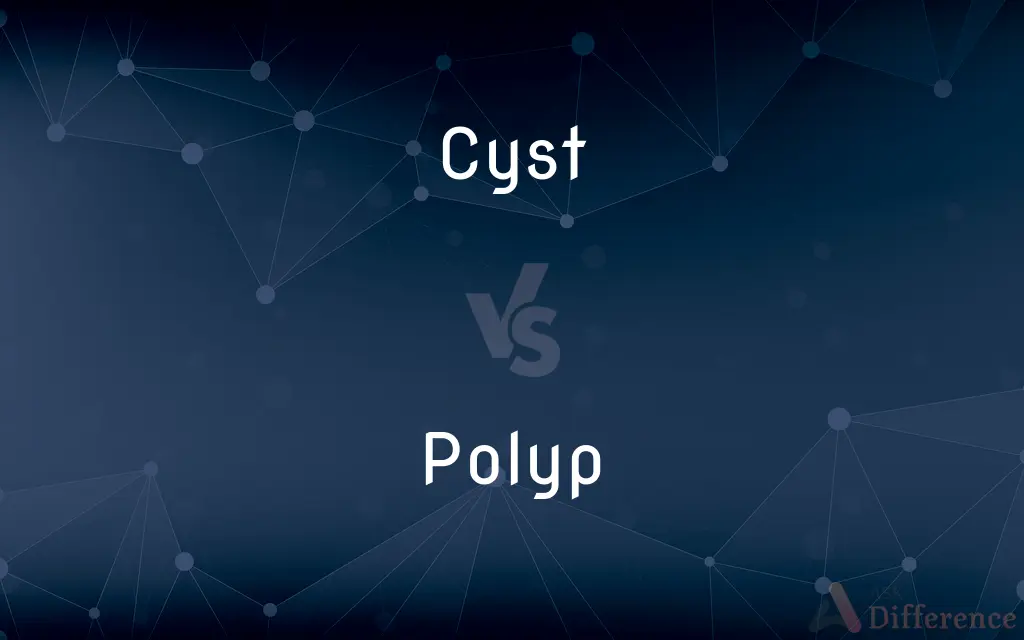Cyst vs. Polyp — What's the Difference?
By Tayyaba Rehman — Published on January 31, 2024
A cyst is a closed sac-like structure filled with fluid, semi-solid, or gaseous material, often benign. A polyp is a growth projecting from a mucous membrane, potentially pre-cancerous.

Difference Between Cyst and Polyp
Table of Contents
ADVERTISEMENT
Key Differences
A cyst is a closed, capsule-like structure that can develop in various body tissues. It typically contains fluid, semi-solid, or gaseous material. Cysts can be found in different parts of the body, including the skin, ovaries, and kidneys. Polyps, in contrast, are growths that protrude from a mucous membrane, most commonly found in areas like the colon, nose, and uterus. Unlike cysts, polyps are firmly attached to the underlying tissue.
The formation of a cyst usually involves the abnormal collection of fluid in a new tissue growth. Cysts can be caused by infections, blockages of ducts, or chronic inflammatory conditions. Polyps, however, grow due to the abnormal proliferation of the mucous membrane cells and are often associated with inflammation or genetic mutations.
Cysts are generally benign and do not usually lead to cancer. They might not cause symptoms unless they grow large, rupture, or become infected. Polyps vary in their potential to become cancerous, with some types like colon polyps having a known risk for developing into cancer, especially if they are left untreated over a long time.
Diagnosis of a cyst often involves imaging tests like ultrasounds, CT scans, or MRIs, and sometimes a biopsy to rule out malignancy. For polyps, diagnosis typically involves endoscopic examinations like colonoscopies or nasal endoscopies, often followed by a biopsy to assess the risk of cancer.
Treatment for cysts may include monitoring, drainage, or surgical removal, depending on the size, location, and symptoms. Polyps are usually removed surgically, especially if there is a risk of cancer, and regular monitoring is often recommended to watch for new growths.
ADVERTISEMENT
Comparison Chart
Structure
Closed sac-like, filled with fluid/material
Growth projecting from mucous membrane
Common Locations
Skin, ovaries, kidneys
Colon, nose, uterus
Cause
Blockages, infections, inflammation
Cell proliferation, inflammation, genetics
Cancer Risk
Generally benign, rarely cancerous
Varies, some types may become cancerous
Diagnosis and Treatment
Imaging tests, possible removal
Endoscopic exam, often surgical removal
Compare with Definitions
Cyst
An abnormal growth that can contain air, fluid, or semi-solid material.
A cyst was found during the routine skin examination.
Polyp
A protrusion that can develop in organs like the colon.
Nasal polyps were causing her breathing issues.
Cyst
A non-cancerous, enclosed pouch in the body.
The dentist found a small cyst in the patient's jawline.
Polyp
A growth projecting from a mucous membrane.
The colonoscopy revealed several small polyps.
Cyst
A capsule-like pocket of membranous tissue.
The ovarian cyst was causing her discomfort.
Polyp
A mucosal outgrowth, often found in the gastrointestinal tract.
The gastrointestinal polyp was benign.
Cyst
An abnormal membranous sac in the body containing a gaseous, liquid, or semisolid substance.
Polyp
A growth that can vary in size, shape, and cancer risk.
Regular screenings can help detect polyps early.
Cyst
A sac or vesicle in the body.
Polyp
A body form of a cnidarian, such as a hydra or coral, that is cylindrical in shape, has a mouth usually surrounded by tentacles at one end, and is often attached to something at the other end.
Cyst
(Biology) A small capsulelike sac that encloses certain organisms in their dormant or larval stage.
Polyp
A usually nonmalignant growth or tumor protruding from the mucous lining of an organ such as the nose, bladder, or intestine, sometimes causing obstruction.
Cyst
(Botany) A thick-walled resting spore, as in certain algae or fungi.
Polyp
(medicine) An abnormal growth protruding from a mucous membrane.
Cyst
A pouch or sac without opening, usually membranous and containing morbid matter, which develops in one of the natural cavities or in the substance of an organ.
Polyp
(zoology) A cylindrical coelenterate, such as the hydra, having a mouth surrounded with tentacles.
Cyst
(medicine) Of or pertaining to the urinary bladder or gall bladder (in compounds).
Cystectomy, cystitis, cystoscopy
Polyp
One of the feeding or nutritive zooids of a hydroid or coral.
Cyst
A pouch or sac without opening, usually membranous and containing morbid matter, which is accidentally developed in one of the natural cavities or in the substance of an organ.
Polyp
A small vascular growth on the surface of a mucous membrane
Cyst
One of the bladders or air vessels of certain algæ, as of the great kelp of the Pacific, and common rockweeds (Fuci) of our shores.
Polyp
One of two forms that coelenterates take e.g. a hydra or coral: usually sedentary and has a hollow cylindrical body usually with a ring of tentacles around the mouth
Cyst
A small capsule or sac of the kind in which many immature entozoans exist in the tissues of living animals; also, a similar form in Rotifera, etc.
Polyp
An abnormal tissue growth that can be pre-cancerous.
The doctor recommended removing the polyp to prevent cancer risk.
Cyst
A closed sac that develops abnormally in some body structure
Cyst
A small anatomically normal sac or bladderlike structure (especially one containing fluid)
Cyst
A fluid-filled sac that can form in various body tissues.
The ultrasound revealed a small cyst on her kidney.
Cyst
A benign, closed structure in the body.
The cyst on his back was removed surgically.
Common Curiosities
Can cysts become cancerous?
Rarely, but most cysts are benign and non-cancerous.
What is a cyst?
A fluid-filled, closed structure in the body, typically benign.
Are polyps always cancerous?
No, but some types, especially in the colon, can develop into cancer.
What is a polyp?
A growth projecting from a mucous membrane, potentially pre-cancerous.
How are cysts formed?
They can form due to infections, blockages, or chronic inflammation.
What are common locations for polyps?
Often in the colon, nose, or uterus.
How are cysts diagnosed?
Through imaging tests like ultrasounds, CT scans, or MRIs.
Where can cysts occur in the body?
Anywhere, but common sites include skin, ovaries, and kidneys.
How are polyps diagnosed?
Usually with endoscopic exams like colonoscopies or nasal endoscopies.
How are polyps treated?
Most are removed surgically, especially if there's a cancer risk.
What causes polyps?
They result from abnormal cell growth, often due to inflammation or genetic factors.
What are the treatment options for cysts?
Depending on the case, monitoring, drainage, or surgical removal.
Can cysts cause symptoms?
Yes, if they grow large, rupture, or get infected.
Do polyps always show symptoms?
Not always; many are discovered during routine screenings.
Is regular monitoring necessary for polyps?
Yes, to check for new growths and assess cancer risk.
Share Your Discovery

Previous Comparison
Gasoline vs. Diesel
Next Comparison
Fexofenadine vs. CetirizineAuthor Spotlight
Written by
Tayyaba RehmanTayyaba Rehman is a distinguished writer, currently serving as a primary contributor to askdifference.com. As a researcher in semantics and etymology, Tayyaba's passion for the complexity of languages and their distinctions has found a perfect home on the platform. Tayyaba delves into the intricacies of language, distinguishing between commonly confused words and phrases, thereby providing clarity for readers worldwide.
















































